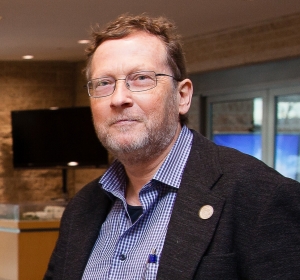Top 'one health' expert to lead infectious diseases centre
Research news
Geelong looks set to be firmly positioned on the global infectious diseases map, with the appointment of international virology and ‘One Health’ expert, Professor Soren Alexandersen as Director of the Geelong Centre for Emerging Infectious Diseases (GCEID).
Originally from Denmark, Professor Alexandersen has had an international career in virology, epidemiology and veterinary pathology for over 30 years, and has held senior positions in world class laboratories in Europe, Canada and the USA, as well as undertaking field research virtually all over the world, including wildlife studies in Africa and livestock studies in Pakistan and China, to name a few.
His most recent position has been as Executive Director of Canada’s National Centres for Animal Disease.
Other career highlights include directing the Danish Veterinary Institute for Virus Research and a Professorship at the Royal Veterinary and Agricultural University in Copenhagen, Denmark. He has also worked at the World Reference Laboratory for Foot-and-Mouth Disease at the UK’s Pirbright Institute, the US National Institutes of Health’s Rocky Mountain Laboratories in Montana and the Veterinary College of Iowa State University.
Professor Alexandersen is one of the world’s leading experts on “One Health” – the multidisciplinary approach to managing infectious diseases in people, animals, and the environment, which lies at the heart of GCEID - Australia’s first “One Health” facility.
Established last year, GCEID is a multidisciplinary collaboration between Deakin University, Barwon Health and CSIRO’s Australian Animal Health Laboratory, which has been strongly supported by all levels of government.
GCEID will play an important role in Geelong’s transition to a knowledge-based economy and is expected to support up to 30 ongoing jobs - and to create additional opportunities through flow-on commercialisation of biotech innovations in the region.
Professor Alexandersen explained that “One Health” is not a new concept, as it was behind the control of infections such as bovine tuberculosis and brucellosis decades ago, but a modern understanding has developed over the past two decades, as a result of outbreaks including Ebola and avian influenza, with scientists acknowledging that human, livestock and wildlife health can’t be understood or controlled in isolation.
“’One Health’ recognises that there is no distinction between diseases and infections in animals and humans,” he said. “Of course, human beings are just another species of animal and we need to control such infections at their source, before they become a serious problem for human health.”
“Veterinarians have appreciated the risks of cross-infection for a long time, working with animals in agriculture, wildlife and zoos or with domestic pets, but it is newer ground for the medical profession and we need to get everyone working together.”
“Diseases such as Ebola, SARS and the Hendra virus demonstrate the damage such viruses can cause. There is an increasing risk of infections of man, livestock, pets and wildlife as a result of globalization and modern processes. As one example, the outbreak of equine influenza in 2007 cost Australia around $1 billion. Recently, in the US around 50 million poultry had to be culled, as a result of avian influenza.”
A key priority will be to strengthen the strong collaborations already established by GCEID, and build new partnerships within Australia and overseas. Professor Alexandersen has a myriad of contacts he can call on across the globe to establish new research partnerships for the centre.
He is excited to be moving to Geelong, to learn more about Australia’s ecosystems and be involved with a new group of world class researchers.
“I have been very impressed by the quality of research at Deakin and AAHL, where researchers developed the world’s first vaccine for the Hendra virus, among many achievements,” he said.
His arrival will coincide with the opening of new GCEID laboratories at Barwon Health’s University Hospital Geelong – and will undoubtedly help to cement GCEID’s position as a dynamic, world-class research facility.
Share this story
 Professor Soren Alexandersen is preparing to take the helm at GCEID.
Professor Soren Alexandersen is preparing to take the helm at GCEID.
